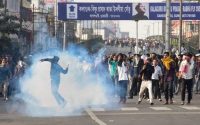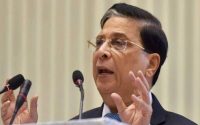$100 Website Offer
Get your personal website + domain for just $100.
Limited Time Offer!
Claim Your Website NowFrom Kashmir’s Internet freedom to Tata sons, 10 big stories from Supreme Court reopening week.
Source – hindustantimes.com
The Supreme Court, which reopened on January 6 after an 18-day winter break, had a hectic first week in 2020.
Here are the important developments from the top court last week.
Freedom of speech, freedom to trade through internet is a fundamental right
Restrictive orders suspending internet, telecommunication and movement should be published by the government indicating the specific reasons for imposing the clampdowns and it should be proportional to the concerns necessitating such suspension, the Supreme Court held on January 10 in a significant judgment ordering the Jammu & Kashmir administration to review all restrictive orders passed by the government in Kashmir including suspension of internet services in the Valley.
In its 130-page ruling, the top court held that the freedom of speech and expression and freedom to carry on trade or profession through internet is a fundamental right under Article 19 of the Constitution and any order suspending internet under Temporary Suspension of Telecom Services (Public Emergency or Public Service) Rules, 2017 (Suspension Rules) can be only for a temporary duration and not for an indefinite period.
Appointment of teachers to Madrasas can be regulated
The Supreme Court held that government can in “national interest” frame laws to regulate the appointment of teachers to educational institutions regardless of whether they are run by majority or minority community provided the intent behind such a law is to ensure the standard of excellence of the institutions.
A bench of justice Arun Mishra and justice UU Lalit upheld the validity of West Bengal Madrasah Service Commission Act, 2008 (Act) which regulate the process of appointment of teachers in aided madrasas recognised as minority institutions through a commission created by the that state’s government and set aside the judgment of Calcutta high court which had struck down the commission created under the act unconstitutional.
CJI-led 9 judge bench to hear Sabarimala petitions
The court announced that a nine-judge bench headed by Chief Justice of India, SA Bobde, will hear the petitions concerning entry of women between the age group 10-50 into the Sabarimala temple, the hill shrine in Kerala dedicated to Lord Ayyappa.
As per the notice available on SC website, besides CJI Bobde, the bench will have justice R Banumathi, justice Ashok Bhushan, justice L Nageswara Rao, justice Mohan M Shantanagoudar, justice S Abdul Nazeer, justice R Subhash Reddy, justice BR Gavai and justice Surya Kant. The hearing in the matter is slated to commence on January 13.
Probe into alleged overvaluation of coal imports by Adani revived
The top court paved the way for resuming overseas probe against Adani group in a case concerning alleged overvaluation of coal imports from Indonesia. The court stayed an October 17, 2019, judgment of Bombay high court which had granted relief to Adani Group by quashing the letter of rogatory (LoR) issued by a Mumbai court.
A letter of rogatory, which is issued by a magistrate under Section 166-A of the Code of Criminal Procedure (CrPC), is a request to a judicial or any other authority in a foreign jurisdiction to gather evidence. A bench headed by CJI Bobde and comprising justice BR Gavai and justice Surya Kant after hearing the appeal filed by Directorate of Revenue Intelligence (DRI) stayed the high court verdict on January 8 and sought reply from Adani Enterprises Limited, the flagship entity of Adani Group.
No evidence of murder in Muzaffarpur shelter home
The Central Bureau of Investigation (CBI) informed the Supreme Court on January 8 that the 35 girls believed to have been murdered in Muzaffarpur shelter home in Bihar are alive and the investigating agency could not procure any evidence regarding any of the alleged murders in the shelter home.
Attorney General KK Venugopal, representing the CBI, told the court that all the 35 girls have been traced and suspicions of the existence of a burial ground where human bones were unearthed were also negatived after a probe revealed that the bones belonged to two adults and not children.
Country going through difficult times, CJI SA Bobde
The country is witnessing troubled times and petitions in the Supreme Court should not exacerbate the situation, CJI Bobde observed on January 9 on an unusual petition that wants the top court to declare the contentious Citizenship (Amendment) Act, 2019 (CAA) as constitutional.
“Country is going through difficult times. The object should be to bring about peace. Such petitions don’t help. As it is, there is a lot of trouble”, the CJI said, a reference to the widespread protests – some of them violent – that broke out after parliamentary approval to the law.
2016 Mercedes hit and run accused to be tried as juvenile
The 17-year-361-days-old boy, behind the wheel of his father’s speeding Mercedes Benz, who hit and killed marketing professional Siddharth Sharma, 32, on April 4, 2016, will not go to jail for his crime with the Supreme Court ruling that the act of the accused, a juvenile at the time of the commission of the offence, does not fall within the category of “heinous offences” under the Juvenile Justice Act, 2015 (JJ Act).
Under the act, only juveniles committing heinous crimes will be tried as adults. Consequently, the accused will not be tried as an adult but will be tried as a juvenile under the JJ Act without entailing any serious punishment.
Delhi gang rape convicts file curative petition
Two of the four convicts in the 2012 Delhi gang-rape case, Vinay Sharma and Mukesh, filed curative petitions in the Supreme Court challenging the May 2017 judgment of the court which had upheld their conviction and death sentence. The curative petitions will be heard in chambers by a five-judge bench on January 14.
A Delhi court had on January 7 issued a death warrant against four convicts in the 2012 case – Mukesh Singh, Pawan Gupta, Vinay Sharma and Akshay Singh – and they are scheduled to be executed on January 22 at 7am in the Tihar Jail premises.
The convicts have two weeks’ time to file both the curative and mercy petition.
Relief to Tata Sons
Tata Sons Limited, the holding company of the Tata Group, secured temporary relief from the top court which stayed the December 18, 2019, judgment of the National Company Law Appellate Tribunal (NCLAT) which had reinstated Cyrus Mistry as the executive chairman of Tata Sons Limited and as a director on the boards of other Tata Group companies.
A CJI-led bench said that the NCLAT judgment has errors remarking that “it granted a relief which was not prayed for”.
Plea for reservation for Dalit Christians
Social exclusion of people from Scheduled Caste and Scheduled Tribe (SC/ST) background who have converted from Hinduism to other religions like Christianity and Islam is a pertinent issue which requires the consideration of the Supreme Court, said CJI Bobde while hearing a plea seeking reservation benefits for Christians of SC origin.
“We will hear it as soon as possible,” remarked CJI Bobde when the petition came up for hearing on January 8 before a bench which also has justice BR Gavai and justice Surya Kant. The court issued notice to the central government in the matter.



